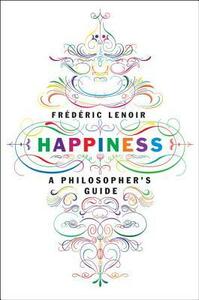Take a photo of a barcode or cover
Nice survey of how different philosphers throughout history have defined happiness.
This is a short, well-written philosophical overview of the concept of happiness. I did not find much new in this book, but it was an enjoyable, relaxing read.
Best for: Former philosophy students, current philosophy students, or anyone interested in looking at happiness from a more philosophical, less how-to perspective.
In a nutshell: French philosopher Frederic Lenoir examines what many great thinkers have had to say about how we can be happy in life.
Line that sticks with me: “It is essential for us not just o know ourselves, but also to test out our strengths and weaknesses, to correct and improve within us those things that can be changed, but without trying to distort or thwart our deepest being.” (p 48)
Why I chose it: The cover art is pretty fabulous - it made me smile, which seemed like a good sign.
Review: This is fairly concise survey of ancient, modern, western and eastern thought as it relates to happiness. Is the Stoic concept of being aware of how we will lose everything eventually and so not getting too attached what will help us be happy? Or is it a spiritual connection to the divine? Is it self-knowledge and self-improvement? Is it serving others? Does our disposition lead to some self-fulfilling prophesies - are optimists happier because they are optimists?
Lenoir offers up support for all of these ideas, examining the regulars (Aristotle, Kant) while also bringing in some who might be lesser known even to those who study philosophy. I found that the book got me to thinking even more about what I value and the decisions I make each day about how I choose to live my life. It is not a guide to becoming happy, at least not directly; instead it is a meditation on what happiness looks like, whether it is even worth striving for, and what it takes to retain it.
This would have gotten four stars except for one glaring, frustrating issue: save a brief discussion of his enjoyment of Indian sage Ma Anandamayi near the very end, Mr. Lenoir does not bring any women philosophers into the discussion. As someone who chose to take on this project, ostensibly with fairly limitless boundaries (he has published many books previously and so is a known entity), he could have taken the time to explore some of the lesser known philosophers who are women. The book isn’t about which thinkers influenced the philosophy of happiness so much as a discussion of the validity or import of their thought; as such I think there was a ton of space for him to bring in much more interesting individuals than the usual parade of dead white guys.
In a nutshell: French philosopher Frederic Lenoir examines what many great thinkers have had to say about how we can be happy in life.
Line that sticks with me: “It is essential for us not just o know ourselves, but also to test out our strengths and weaknesses, to correct and improve within us those things that can be changed, but without trying to distort or thwart our deepest being.” (p 48)
Why I chose it: The cover art is pretty fabulous - it made me smile, which seemed like a good sign.
Review: This is fairly concise survey of ancient, modern, western and eastern thought as it relates to happiness. Is the Stoic concept of being aware of how we will lose everything eventually and so not getting too attached what will help us be happy? Or is it a spiritual connection to the divine? Is it self-knowledge and self-improvement? Is it serving others? Does our disposition lead to some self-fulfilling prophesies - are optimists happier because they are optimists?
Lenoir offers up support for all of these ideas, examining the regulars (Aristotle, Kant) while also bringing in some who might be lesser known even to those who study philosophy. I found that the book got me to thinking even more about what I value and the decisions I make each day about how I choose to live my life. It is not a guide to becoming happy, at least not directly; instead it is a meditation on what happiness looks like, whether it is even worth striving for, and what it takes to retain it.
This would have gotten four stars except for one glaring, frustrating issue: save a brief discussion of his enjoyment of Indian sage Ma Anandamayi near the very end, Mr. Lenoir does not bring any women philosophers into the discussion. As someone who chose to take on this project, ostensibly with fairly limitless boundaries (he has published many books previously and so is a known entity), he could have taken the time to explore some of the lesser known philosophers who are women. The book isn’t about which thinkers influenced the philosophy of happiness so much as a discussion of the validity or import of their thought; as such I think there was a ton of space for him to bring in much more interesting individuals than the usual parade of dead white guys.
challenging
informative
reflective
slow-paced
كل واحد منا يحمل عالمه في قلبه.
راائع جدا كمضمون و كترجمة.
راائع جدا كمضمون و كترجمة.
Comme à chaque fois avec Frédéric Lenoir, un ensemble de perles de sagesse, retraçant un vaste champs de philosophies occidentales et orientales à travers l'Histoire et leurs points de vues sur la nature et la voie vers le bonheur. Une belle critique aussi de notre société actuel dans un appel à retrouver certaines valeurs ainsi qu'un accord avec son "moi intérieur" et sa nature profonde. Ce livre ouvre les yeux sur beaucoup de choses et remet en perspective bien des quêtes vaines que l'on tente de mener contre l'adversité.
كان لدي إقبال لقراءة الكتب الفلسفية بعد قراءتي لكتب مصطفى محمود، لا أعلم بما كنت أشعر حين ذهبت لقسم الكتب الفلسفية في المكتبة و أخذت أول كتاب تقع عيني عليه، فموضوع السعادة مكرر و قرأت عنه الكثيرًا ، فكيف اذا كُت بأسلوب فلسفي ؟ شعرت و كأنهم يبالغون في موضوع في غاية البساطة، فالسعادة بالنسبة لي تكمن في الداخل و ليس من الخارج ، فالمحيط مجرد عامل مساعد و لكنه ليس كل شيء! استمتعت في قراءته في البداية و لم اذق طعم السعادة التي يزعمونها إلا حين أنهيته، عذرًا و لكنه كان تعريفًا للملل.
hopeful
informative
inspiring
reflective
Leí este libro para una clase de la universidad. Definitivamente no lo recomiendo. Además de presentar la felicidad como un estilo de vida en vez de un sentimiento esporádico, pretende simplificar su búsqueda bajo visiones sobre-simplificadas de la filosofía, la ciencia y la psicología. Tratar de resumir a Aristóteles, Epicuro o Schopenhauer en dos páginas es una señal de que el libro está poco profundo, además de que trata de justificar sus puntos con poca evidencia disponible.
Un autre bon livre de Frédéric Lenoir, très dense, concis, mais en même temps facile à lire et accessible. On y parle évidemment du bonheur et des perception et moyens d'y arriver selon divers philosophes, religions. Manière de penser, mani`re d'être, manière de vivre. Ce livre fait réfléchir et fait aussi du bien. Une chaude recommandatin pour ceux qui s'intéresse au bonheur et à la philosophie.
Prendre note qu'on est dans une réelle réflexion et non pas dans la psycho-pop et sa pensée magique!
Prendre note qu'on est dans une réelle réflexion et non pas dans la psycho-pop et sa pensée magique!



